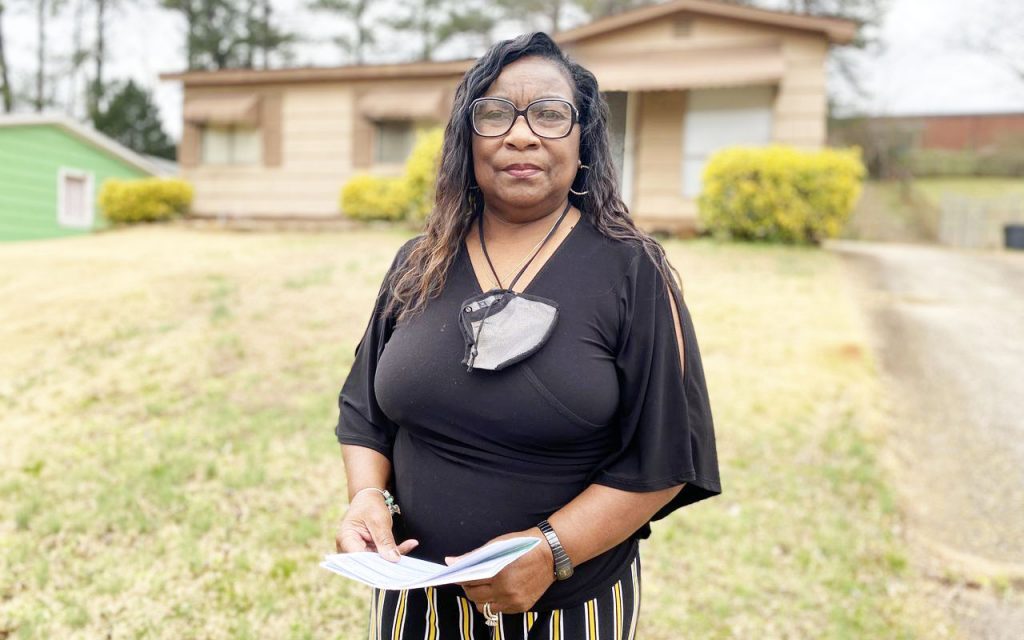Barbara Bailey is a landlord who rents a house in Birmingham to a man whose wife collapsed and died in April of 2020, likely to COVID. Since then, Bailey’s tenant has been unable to pay thousands of dollars in rent. She’s made up the difference herself, refinancing the mortgage and paying plumbing expenses and home insurance.
“Of course, I was going to help him,” she said. “I was trying to renegotiate the mortgage to try to get it down into an area that he could pay it. I was not going to evict him.”
To help landlords, such as Bailey, and tenants who are facing hardship during the pandemic the federal government sent billions of dollars to states, counties, and cities. Some Alabama cities and counties have successfully handed out these dollars to landlords and tenants, but Alabama’s statewide program has been mired in delays.
Now the U.S. Treasury is taking back some of the leftover money. That’s tens of millions of dollars from states, including Alabama, that did not distribute the aid quickly enough. This month, the U.S. Treasury recaptured $42 million of the state’s pot of $263 million, due to Alabama’s failure to meet distribution deadlines set by the department. Those dollars will now be sent elsewhere.
Kristi Gates, a spokesperson at the Alabama Housing and Finance Authority said vetting applications is complex.
“The processing of those applications requires more scrutiny and time to give the tenant every opportunity to prove eligibility,” she said.
More money is likely to be lost next month. Alabama anticipates another $30 million of the funds will be recollected by the federal government in March, according to the state department.
That leaves an estimated remaining $92 million in the state’s fund, according to the department.
So far Alabama has given out just $72.9 million of the $263 million to 14,565 renters.
But the state reported nearly as high an amount in rejected applications. That’s $57 million worth of rental assistance applications in Alabama rejected for fraud.
Meanwhile, work is wrapping up. The contractor responsible for running Alabama’s statewide program, Horne LLP, a Mississippi-based company, completes its $9.4 million contract April. It has distributed just over a quarter of the program’s dollars to residents in need. The state has no plans for how to administer the remaining money.
Horne, an accounting and business consulting firm based just outside Jackson, Miss., declined to comment for this story. A spokesperson told AL.com that the company is not authorized to speak for the state program.
Kristi Gates, a spokesperson for the housing department, said the demand in Alabama, based on the number of applicants who are eligible, has been lower than expected because many requests received by the department were rejected as fraudulent.
“We previously projected that most of the (monetary) allocation would be disbursed based on our estimate of applications to be filed. Our estimate was correct, but we did not anticipate that many of them would be deemed fraudulent,” said Gates, who said the high volume of questionable applications submitted to the program created a hurdles for distribution.
Alabama flagged and reported numerous problems under the category of fraud, according to the housing department. Those include identity theft, failure to validate residency, falsified leases, and inability to verify the existence of landlords or tenants.
“We don’t have a centralized data system to say how many fraudulent applications there have been nationwide,” said Jennifer Schwartz, who works for the National Council of State Housing Agencies, a group that represents state housing departments.
“Unfortunately it is the nature of any program where we’re giving out government assistance, especially a program where you can give out assistance with self-attestation, that there are going to be people who try to game the system.”
Sarah Gallagher, senior project director at the National Low Income Housing Coalition, questioned the inclusion of the “inability to verify the existence of landlords” as evidence of fraud.
“We have not heard or seen examples of a lot of fraudulent applications around the country,” she said
California and several other states reported almost no fraud in their rental assistance programs.
“Programs can’t get in touch with their landlords, and someone just sits there waiting. That’s not a fraudulent activity, that’s a landlord not wanting to participate or not participating,” said Gallagher.
Troubles from the start
Alabama’s program has seen delays from the beginning. And some in the state raised questions about the way the program is being handled.
“I think the biggest lesson is that contracting private companies to deal with public goods is never the goal and should never be the first step that we take,” said Dev Wakeley, Policy Analyst for Alabama Arise, a non-profit that advocates for low-income people
Horne LLP received a no-bid contract to manage the process. The contractor bills Alabama $65 an hour for call center specialists and up to $200 an hour for application processing staff.
Early on, advocates, tenants and landlords reported challenges reaching Horne staff at the call center and months long delays in response from the company.
“I don’t know if they have done necessarily a great job of training them on follow up or anything related to getting back in touch with a landlord or tenant,” said Jay Williams, statewide program and policy coordinator for Collaborative Solutions, a non-profit focused on housing issues in Alabama
Other states, including Tennessee, Arkansas, Colorado and Texas, also contracted with Horne to distribute their rental assistance. Multiple states have reported delays.
“We’re strangling these people. We’re actually strangling them,” Alabama Sen. Rodger Smitherman, D-Birmingham, said of the delays at a September 29 meeting of the Legislative Oversight Committee.
The state has said that many restrictions initially imposed by the U.S. Treasury Department added red tape.
Schwartz, with the housing agency advocacy group, said that small states like Alabama received more money than their residents needed due to the lower percentages of renters vs. homeowners and the lower costs of living.
“I don’t really view it as something that’s, ‘Oh, we’re punishing this state and taking that money because they haven’t been able to spend it.’ It’s about right-sizing the grants,” she said.
According to the U.S. Census Bureau, nearly 15 percent of Alabamians live in poverty.
The majority of the applicants to the state’s emergency rental assistance program were Black women, according to data from the department’s quarterly reports on the rental assistance.
Yet a 2021 study by the Urban Institute, a think tank based in Washington D.C., reported more than half of renters and 40 percent of landlords nationwide were not aware of the $46 billion in emergency rental assistance approved by Congress.
Bailey, the landlord whose tenant’s wife passed away, represents low-income tenants and their landlords as an attorney. She said many people she’s spoken with lost loved ones to COVID and that meant a loss of income for their families.
“Some people filed bankruptcy because they’re faced with eviction,” she said.
As a lawyer with a background in accounting and insurance, Bailey knew how to navigate the application requirements for her own tenant, but she said that’s unusual. There’s no lack of demand among tenants, she said, but many, like her tenant, are not computer literate or need help to navigate the system.
“I feel sorry for them because they don’t know what to do.”
Unclear path forward
Alabama says it has no plan yet for how to proceed when Horne’s contract expires in April.
“ERA Alabama is currently assessing and reviewing the ongoing administration of the program for the next year,” said Gates.
A spokesperson for Gov. Kay Ivey declined to comment and referred AL.com to the housing finance authority.
According to the National Low Income Housing Coalition, Alabama is ranked 36th nationally for the percentage of its emergency funds it’s given out, and the state has served two percent of cost-burdened renters.
“Regardless of their spending, there’s still a need. If that money gets reallocated out, folks are not going to get served,” said Gallagher.
Across Alabama, advocates and attorneys have worked to get word out about the program despite limited budgets to do so. But tenants facing eviction are often unable to seek help or even make it to court to help delay proceedings, Kelly McTear, then interim director of the Montgomery Volunteer Lawyers Program, told Al.com in November.
“They think there’s nothing that they can do so they just don’t show up,” she said.
Evictions were up by about 500 percent this fall, according to Alabama Legal Services. In 2021, more than 40 percent of Alabama renters reported fearing eviction by the year’s end, according to an analysis of U.S. census data by the financial services group LendingTree.
Williams, with Collaborative Solutions, believes the state should voluntarily reallocate the remaining $92 million in state funds to successful local programs since Horne’s contract is expiring.
“What’s happening right now is there’s just one location to complete the application. That’s creating a bottleneck,” he said.
A state housing department spokesperson said the possibility of reallocating some of the assistance money to cities and counties is on the table, but they have not heard from the local programs.
“We would consider requesting Treasury to allocate any surplus funds to other local jurisdictions, however, no jurisdictions have expressed an interest in this option,” said Gates.
When Bailey, the landlord, first found out about the City of Birmingham’s federally funded Emergency Rental Assistance program, she thought it might be the solution for her tenant who wasn’t sure how he would ever catch up.
Bailey applied and was approved for $9,750 in assistance for back rent but this month learned that wouldn’t happen. Unlike the state, the City of Birmingham already gave out all its $9.6 million and is having to redirect applicants who’ve already been approved to apply elsewhere.
“They said ‘Well, there’s some good news and bad news. The good news is you were approved. The bad news is we don’t have any money.’”
She estimates she’s lost over $14,000 in rental income in an effort to help her tenant.
Bailey said she may apply for help from the state’s fund, but she’s been unable to get the necessary paperwork due to ongoing miscommunication with the city. The state program told Bailey she must start her entire application over.
“All I want is the money that is due to my application,” she said. “The government allocated this for tenants like I have, and it’s due.”











